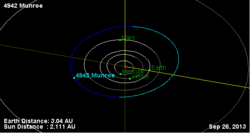Astronomy:4942 Munroe
 Orbital diagram of Munroe | |
| Discovery [1] | |
|---|---|
| Discovered by | H. Debehogne |
| Discovery site | La Silla Obs. |
| Discovery date | 24 February 1987 |
| Designations | |
| (4942) Munroe | |
| Named after | Randall Munroe (American cartoonist)[2] |
| 1987 DU6 · 1955 MS 1971 GE · 1990 CB | |
| Minor planet category | main-belt · (inner) |
| Orbital characteristics [1] | |
| Epoch 4 September 2017 (JD 2458000.5) | |
| Uncertainty parameter 0 | |
| Observation arc | 61.76 yr (22,559 days) |
| |{{{apsis}}}|helion}} | 2.5000 AU |
| |{{{apsis}}}|helion}} | 1.9026 AU |
| 2.2013 AU | |
| Eccentricity | 0.1357 |
| Orbital period | 3.27 yr (1,193 days) |
| Mean anomaly | 9.2509° |
| Mean motion | 0° 18m 6.48s / day |
| Inclination | 3.8333° |
| Longitude of ascending node | 278.09° |
| 11.227° | |
| Physical characteristics | |
| Mean diameter | 3.453±0.139 km[3] |
| Geometric albedo | 0.936±0.183[3] |
| SMASS = X [1] | |
| Absolute magnitude (H) | 13.5[1] |
4942 Munroe, provisional designation 1987 DU6, is an asteroid from the inner regions of the asteroid belt, approximately 3 kilometers in diameter. It was discovered on 24 February 1987, by Belgian astronomer Henri Debehogne at ESO's La Silla Observatory in northern Chile, and later named after American cartoonist and former NASA roboticist Randall Munroe.[2]
Orbit and classification
Munroe orbits the Sun in the inner main-belt at a distance of 1.9–2.5 AU once every 3 years and 3 months (1,193 days). Its orbit has an eccentricity of 0.14 and an inclination of 4° with respect to the ecliptic.[1] It was first identified as 1955 MS at the Leiden Southern Station (Johannesburg-Hartbeespoort) in 1955, extending the body's observation arc by 32 years prior to its official discovery observation.[2]
Physical characteristics
In the SMASS taxonomy, Munroe is characterized as an X-type asteroid. It has an absolute magnitude of 13.5.[1]
Diameter and albedo
According to the survey carried out by the NEOWISE mission of NASA's Wide-field Infrared Survey Explorer, Munroe measures 3.453 kilometers in diameter and its surface has an exceptionally high albedo of 0.936.[3] On his private blog, Randall Munroe (after whom the asteroid is named) calculates that the asteroid is between 6 and 10 kilometers in diameter, comparable in size to the Chicxulub asteroid.[4]
Lightcurves
As of 2017, Munroe's rotation period, poles and shape remain unknown.[1][5]
Naming
In 2013, it was named after Randall Munroe (born 1984), a former NASA roboticist and the author of the webcomic xkcd.[6] The name was chosen by xkcd readers Lewis Hulbert and Jordan Zhu.[7] The official naming citation was published on 22 July 2013 (M.P.C. 84378).[8]
References
- ↑ Jump up to: 1.0 1.1 1.2 1.3 1.4 1.5 1.6 "JPL Small-Body Database Browser: 4942 Munroe (1987 DU6)". Jet Propulsion Laboratory. https://ssd.jpl.nasa.gov/sbdb.cgi?sstr=2004942;cad=1.
- ↑ Jump up to: 2.0 2.1 2.2 "4942 Munroe (1987 DU6)". Minor Planet Center. https://www.minorplanetcenter.net/db_search/show_object?object_id=4942.
- ↑ Jump up to: 3.0 3.1 3.2 Masiero, Joseph R.; Mainzer, A. K.; Grav, T.; Bauer, J. M.; Cutri, R. M.; Dailey, J. et al. (November 2011). "Main Belt Asteroids with WISE/NEOWISE. I. Preliminary Albedos and Diameters". The Astrophysical Journal 741 (2): 20. doi:10.1088/0004-637X/741/2/68. Bibcode: 2011ApJ...741...68M. http://adsabs.harvard.edu/cgi-bin/bib_query?bibcode=2011ApJ...741...68M. Retrieved 18 April 2017.
- ↑ Munroe, Randall (September 30, 2013). "Asteroid 4942 Munroe". xkcd. http://blog.xkcd.com/2013/09/30/asteroid-4942-munroe/.
- ↑ "LCDB Data for (4942) Munroe". Asteroid Lightcurve Database (LCDB). http://www.minorplanet.info/PHP/generateOneAsteroidInfo.php?AstInfo=4942%7CMunroe.
- ↑ Richardson, Chris (October 2, 2013). "xkcd Author Gets Asteroid Named After Him". iEntry Network. http://www.webpronews.com/xkcd-author-gets-asteroid-named-after-him-2013-10.
- ↑ Lecher, Colin (October 2, 2013). "Aw, They Named An Asteroid After The Creator Of XKCD". nextmedia Pty Ltd. http://www.popsci.com.au/science/aw-they-named-an-asteroid-after-the-creator-of-xkcd,380324.
- ↑ "MPC/MPO/MPS Archive". Minor Planet Center. https://www.minorplanetcenter.net/iau/ECS/MPCArchive/MPCArchive_TBL.html.
External links
- Asteroid Lightcurve Database (LCDB), query form (info )
- Dictionary of Minor Planet Names, Google books
- Asteroids and comets rotation curves, CdR – Observatoire de Genève, Raoul Behrend
- Discovery Circumstances: Numbered Minor Planets (1)-(5000) – Minor Planet Center
- 4942 Munroe at AstDyS-2, Asteroids—Dynamic Site
- 4942 Munroe at the JPL Small-Body Database
 |

